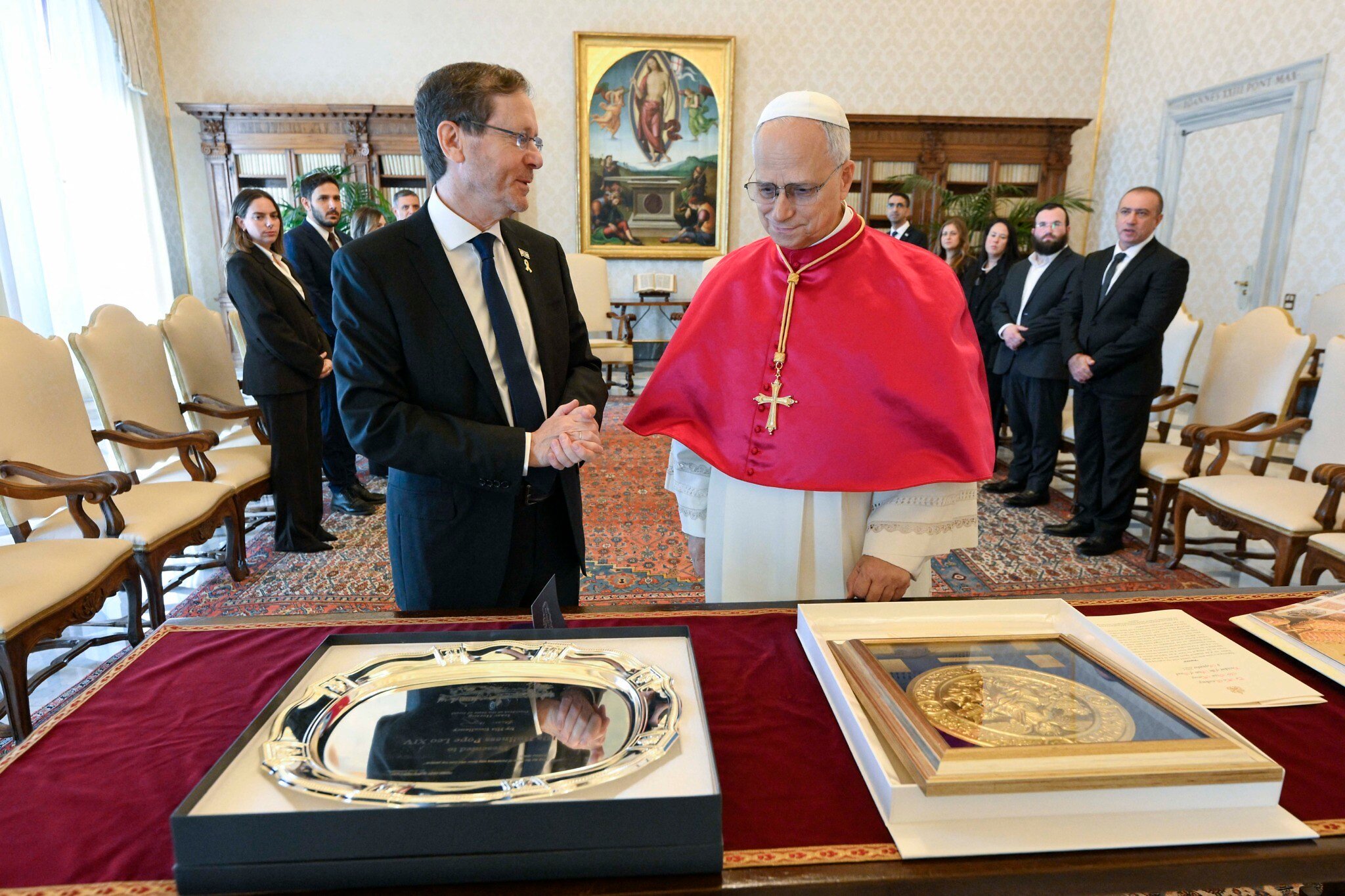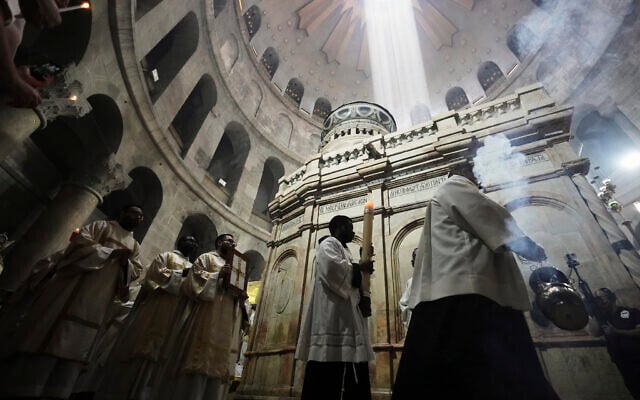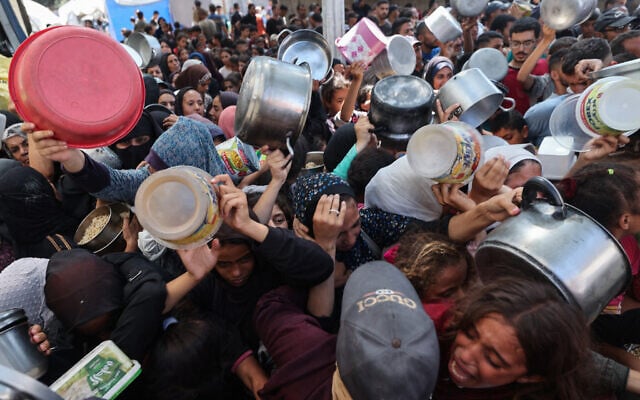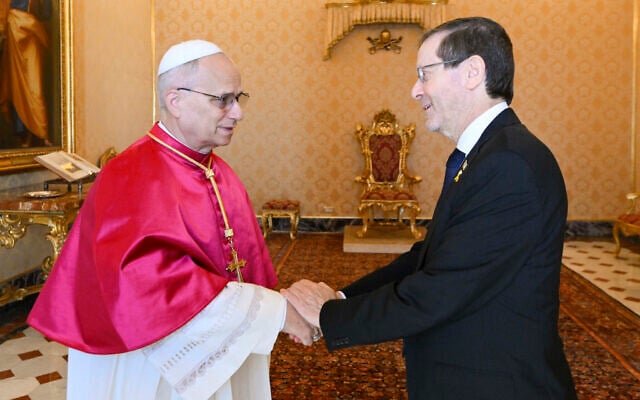


Pope Leo XIV stressed the need for a two-state solution and a permanent ceasefire in the war in Gaza during a meeting Thursday with President Isaac Herzog at the Vatican.
During the meeting, joined by the Vatican’s political leadership, Herzog asked the pontiff to assist in efforts to free the hostages, a day before the 700th day of their captivity in Gaza, according to a statement by the President’s Residence.
Herzog also sought to reassure the Vatican over the treatment of Christians in the Holy Land and the situation in Gaza.
According to the Vatican readout, Leo expressed his hope for “a speedy resumption of negotiations so that, with willingness and courageous decisions, as well as the support of the international community, the release of all hostages can be achieved, a permanent ceasefire reached with urgency, the safe entry of humanitarian aid into the most affected areas be facilitated, and full respect for humanitarian law be ensured, together with the legitimate aspirations of the two peoples.”
He also said that “a two-state solution is the only way out of the current war.”
The pope raised the often thorny issue of relations between Israeli government offices and the Catholic Church in Israel, “with particular attention to the importance of Christian communities and their commitment, both locally and throughout the Middle East, to human and social development, especially in the areas of education, the promotion of social cohesion, and regional stability.”
Herzog “emphasized that the 48 men and women still in captivity are in immediate and grave danger, and he called for intensified international efforts to secure their release as soon as possible,” the President’s Residence statement read, adding that Herzog asked the pope to meet with hostage families.
They also discussed the global fight against antisemitism, and “the importance of protecting minorities in the Middle East – particularly Christian communities and the Druze community in Syria.”
Herzog’s office said that “the situation of Christian communities in Israel, the West Bank, and Gaza” was discussed, a likely reference to consistent criticism from the Catholic Church over Israel’s policies toward Christians in Israel and the West Bank.
“This is a very important and sensitive issue,” Herzog said after the meeting. “I spoke about the wonderful communities in Israel, about the duty and need to safeguard and protect them, and I reiterated Israel’s clear commitment to freedom of religion, of worship, and of course to the development and protection of the Christian communities in the Holy Land.”
The Vatican brought up the humanitarian situation in Gaza as well.
According to Herzog, the issue “resonates strongly in the world’s media and certainly affects Israel’s relations with various countries. I described the massive Israeli effort currently underway, which has significantly changed the situation, the facts, and the reality on the ground.”
Vatican Secretary of State Pietro Parolin and Foreign Minister Archbishop Paul Richard Gallagher also joined the meeting.
“The very fact that Pope Leo XIV, who has just entered his office, receives the president of the State of Israel at the Vatican is a very important statement,” Herzog said. “It shows the great importance of the relationship between the Holy See and the State of Israel, and of course with the Jewish people. The issues at hand are extremely sensitive and weighty these very days.”
Herzog added that Israel “would be delighted” to host Leo on a visit.
The audience was the first between Leo and an Israeli head of state. Leo spoke by telephone with Prime Minister Benjamin Netanyahu in July after an Israeli shell slammed into the only Catholic church in Gaza, killing three people and wounding the parish priest.
The Vatican has tried to maintain its tradition of diplomatic neutrality throughout the war, calling for the return of hostages while denouncing Israel’s attacks against civilians in Gaza. But both Pope Francis before, and Leo since his election in May, have voiced mounting outrage at Israel’s actions in Gaza, with the late pope calling for an investigation to determine if they constituted genocide.
Leo has been stepping up his calls for a halt to the war in Gaza, which began on October 7, 2023, when Hamas-led terrorists rampaged across southern Israel, murdering some 1,200 people, mostly civilians, and taking 251 hostages to Gaza.
Terror groups in the Gaza Strip are holding 48 hostages, including 47 of the 251 abducted by Hamas-led terrorists on October 7, 2023. They include the bodies of at least 26 confirmed dead by the IDF. Twenty are believed to be alive and there are grave concerns for the well-being of two others, Israeli officials have said. Hamas is also holding the body of an IDF soldier killed in Gaza in 2014.
The Hamas-run Gaza health ministry says more than 63,000 people in the Strip have been killed or are presumed dead in the fighting so far, though the toll cannot be verified and does not differentiate between civilians and fighters. Israel says it has killed over 22,000 combatants in battle as of August and another 1,600 terrorists inside Israel during the October 7 onslaught.
Thursday’s release from the Vatican was notably longer than usual for statements about the pope’s meeting with foreign leaders, which typically offer only a few lines of information and do not give specific details about the topics discussed by the pope.
Leo and Herzog announced earlier this week that they would meet, but had disagreed publicly over whose idea the meeting was.
The presidency had issued a release on Tuesday saying Herzog would meet Leo at the pope’s invitation.
In an unusual statement later that day, the Vatican responded: “It is the Holy See’s practice to accede to requests for an audience with the pope made by Heads of State and Government; it is not its practice to extend invitations to them.”




